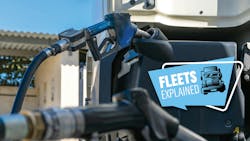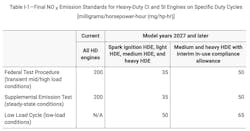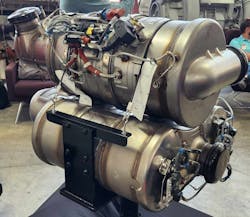This is part of FleetOwner's Fleets Explained, a Trucking 101 series to break down aspects of the trucking and fleet management industries. You can read more from the series, launched in May 2024, at fleetowner.com/fleets-explained. To submit topic ideas, clarifications, and corrections, email [email protected].
Diesel exhaust fluid is the primary solution used in NOx aftertreatment. Most diesel vehicles today cannot legally operate without DEF.
But what is NOx, and why do fleets need DEF to treat it? Here is a breakdown of all the facts relevant to commercial vehicle fleets.
What is NOx?
NOx is a family of significant air pollutants generated mainly through combustion. Diesel vehicles are a major source of NOx pollution.
In trucking, the term NOx represents two specific nitrogen oxides: nitrogen monoxide (NO) and nitrogen dioxide (NO2). NOx is a shorthand for any nitrogen oxides, but NO and NO2 are the relevant compounds among commercial vehicles. Regulators often test for only NO2 as an indicator of the larger group of oxides.
NOx is a pollutant because it can easily have detrimental effects on human and environmental health. Nitrogen oxides are volatile and easily react with other compounds, forming pollutants like ozone and fine particulate matter. Regulators have linked NOx to several human health problems. NOx is also a major contributor to smog and acid rain.
EPA found that, in 1999, vehicles generated about 50% of all anthropogenic NOx. Diesel vehicles are particularly prone to generating NOx: the high pressure, air ratio, and temperature of diesel combustion create an ideal environment for NOx to form.
How is NOx regulated?
In the U.S., two organizations limit commercial vehicles’ NOx emissions through environmental regulations: the U.S. EPA and the California Air Resources Board. EPA’s rules are federal regulations, while CARB’s rules only take effect in states that adopt the specific rules. Since the passage of the 1970 Clean Air Act, EPA and CARB have regularly tightened vehicles’ NOx emissions with new rules every few years.
See also: Fleets Explained: Emissions Regulations
The most recent major NOx regulations come from EPA’s “Control of Air Pollution From New Motor Vehicles: Heavy-Duty Engine and Vehicle Standards” and CARB’s “Heavy-Duty Omnibus.”
How do manufacturers reduce NOx?
To reduce NOx emissions, diesel engine manufacturers take two main approaches: minimizing the NOx generated in combustion and using chemicals to break down NOx after combustion.
Fine-tuning the combustion conditions can reduce the NOx generated by an engine, but most NOx reductions today come from chemical treatments. Breaking down NOx after combustion is called aftertreatment.
For commercial vehicles, selective catalytic reduction (SCR) is the most popular method of minimizing NOx. This method uses an SCR system to mix exhaust with chemicals, reducing NOx to relatively harmless compounds like nitrogen and carbon dioxide.
What is DEF?
Diesel exhaust fluid is a solution in SCR to lower NOx emissions from diesel vehicles. A diesel vehicle’s SCR system uses a method of selective catalytic reduction to remain in compliance with NOx regulations. The SCR system regularly consumes DEF to treat NOx.
According to Cummins, DEF is a carefully blended solution of 32.5% high-purity urea and 67.5% deionized water.
Vehicles regularly need DEF refills to continue operating. Electronic control units can refuse to start a diesel vehicle if they do not detect enough DEF in the reservoir.
How does DEF treat NOx?
DEF works with a catalyst to break down the NOx in vehicle exhaust.
A modern diesel vehicle moves its exhaust gas through an SCR system before leaving the vehicle. The SCR system includes a catalyst housing, where exhaust comes into contact with a specially designed catalyst.
The SCR system periodically sprays DEF in this housing. The catalyst helps the DEF react with NOx, turning both into nitrogen, water, and carbon dioxide.
The chemical reaction that reduces NOx only occurs at high temperatures. At low temperatures, DEF and NOx will not react together. At very low temperatures, DEF will freeze. Manufacturers design SCR systems to maintain temperatures for effective SCR.
Filling DEF
Diesel vehicles with an SCR system consume DEF. These vehicles need regular DEF refills.
DEF is commercially abundant; urea and deionized water are relatively easy to secure in the U.S. Drivers can find DEF at most fueling stations or auto stores. Many drivers refill their DEF tank during refueling stops.
Vehicles consume DEF at various rates. Most vehicle dashboards have a warning when they detect low DEF levels. Foster Fuels estimates that a truck with a 65-gallon fuel tank should refill a five-gallon DEF tank every third or fourth refueling.
About the Author
Jeremy Wolfe
Editor
Editor Jeremy Wolfe joined the FleetOwner team in February 2024. He graduated from the University of Wisconsin-Stevens Point with majors in English and Philosophy. He previously served as Editor for Endeavor Business Media's Water Group publications.



